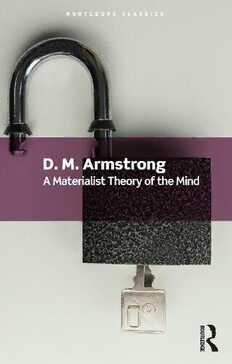Table Of ContentA Materialist
Theory of the Mind
‘A groundbreaking book.’
— David Rosenthal, City University New York, USA
D. M. Armstrong’s A Materialist Theory of the Mind is widely known as one of the
most important defences of the view that mental states are nothing but phys-
ical states of the brain. A landmark of twentieth-century philosophy of mind,
it launched the physicalist revolution in approaches to the mind and has been
engaged with, debated and puzzled over ever since its frst publication over
ffty years ago.
Ranging over a remarkable number of topics, from behaviourism, the will
and knowledge to perception, bodily sensation and introspection, Armstrong
argues that mental states play a causally intermediate role between stimuli,
other mental states and behavioural responses. He uses several illuminating
examples to illustrate this, such as the classic case of pain.
This Routledge Classics edition includes a new Foreword by Peter Anstey,
placing Armstrong’s book in helpful philosophical and historical context.
David Malet Armstrong was born in 1926 in Melbourne,
Australia. He studied philosophy at the University of
Sydney before going to Oxford, taking the recently estab-
lished B. Phil. degree in 1954. He taught briefy at Birkbeck
College, London, before returning to Australia to teach at
the University of Melbourne. He succeeded J.L. Mackie in
Anderson’s chair at Sydney in 1964, where he taught until his
retirement in 1991. He died in 2014.
‘Routledge Classics is more than just a collection of texts…
it embodies and circulates challenging ideas and keeps vital
debates current and alive.’
– Hilary Mantel
The Routledge Classics series contains the very best of
R outledge’s publishing over the past century or so, books that
have, by popular consent, become established as classics in
their feld. Drawing on a fantastic heritage of innovative writ-
ing published by Routledge and its associated imprints, this
series makes available in attractive, afordable form some of
the most important works of modern times.
For a complete list of titles visit:
https://www.routledge.com/Routledge-Classics/
book-series/SE0585
D. M.
Armstrong
A Materialist
Theory of the Mind
With a new Foreword by Peter Anstey
Designed cover image: © ahmed kriter / Getty Images
First published in Routledge Classics 2023
by Routledge
4 Park Square, Milton Park, Abingdon, Oxon OX14 4RN
605 Third Avenue, New York, NY 10158
and by Routledge
Routledge is an imprint of the Taylor & Francis Group, an informa business
Foreword © 2023 Peter Anstey
© 1968, 1993, 2023 D. M. Armstrong
All rights reserved. No part of this book may be reprinted or reproduced
or utilised in any form or by any electronic, mechanical, or other
means, now known or hereafter invented, including photocopying and
recording, or in any information storage or retrieval system, without
permission in writing from the publishers.
Trademark notice: Product or corporate names may be trademarks
or registered trademarks, and are used only for identifcation and
explanation without intent to infringe.
First published 1968 by Routledge & Kegan Paul
Published in Paperback with a new Preface 1993 by Routledge
British Library Cataloguing-in-Publication Data
A catalogue record for this book is available from the British Library
Library of Congress Cataloging-in-Publication Data
A catalog record has been requested for this book
ISBN: 978-1-032-35793-5 (hbk)
ISBN: 978-1-032-35541-2 (pbk)
ISBN: 978-1-003-32865-0 (ebk)
DOI: 10.4324/b23154
Typeset in Joanna
by codeMantra
Contents
FOREWORD TO THE ROUTLEDGE CLASSICS EDITION ix
ACKNOWLEDGEMENTS xv
PREFACE TO THE 1993 EDITION xvii
Introduction 1
PART 1: THEORIES OF MIND 5
1 A Classification of Theories of Mind 7
2 Dualism 18
3 The Attribute Theory 41
4 A Difficulty for any Non-Materialist Theory of Mind 54
5 Behaviourism 60
6 The Central-State Theory 81
viii CONTENTS
PART 2: THE CONCEPT OF MIND 139
7 The Will (1) 141
8 The Will (2) 186
9 Knowledge and Inference 203
10 Perception and Belief 225
11 Perception and Behaviour 264
12 The Secondary Qualities 291
13 Mental Images 313
14 Bodily Sensations 329
15 Introspection 347
16 Belief and Thought 364
PART 3: THE NATURE OF MIND 377
17 Identifcation of the Mental with the Physical 379
BIBLIOGRAPHY 393
INDEX 397
Foreword to the Routledge
Classics Edition
Some books keep on keeping on: A Materialist Theory of the Mind is one
of those books. Now published in the Routledge Classics series,
D. M. Armstrong’s magnum opus is still being cited and is still stimulating
research on the philosophy of mind, even though it frst appeared
back in 1968. The frst appearance of the book was, at the time, a
much anticipated event in the history of analytic philosophy, and it
should come as no surprise that Michael Beaney lists its publication
on his ‘Chronology of analytic philosophy’ in The Oxford Handbook of the
History of Analytic Philosophy (see Beaney 2013, p. 114). The book reached
beyond the English-speaking world, having been translated into P olish,
Japanese and Korean.
In his preface to the paperback edition that appeared in 1993, Arm-
strong took the opportunity to refect on the infuences and origins
of his book and to survey ‘what is living and what is dead’ among its
main themes. By contrast, in this new foreword I aim to zoom out
a little and to survey Armstrong’s writings on materialism about the

